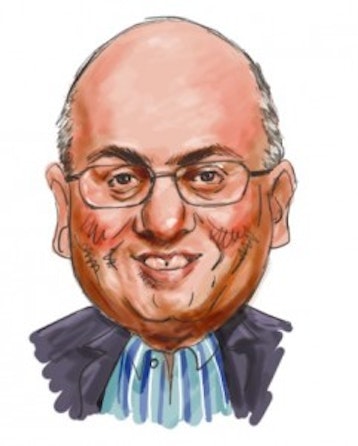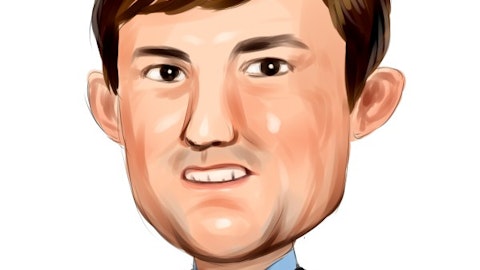
Hedge-fund titan Steven Cohen is casting a shadow over the government’s last outstanding insider-trading trial. Only one person who worked at Cohen’s SAC Capital Management, John Horvath, has been charged in the case, which accuses two hedge-fund bigwigs with illegal trading in shares of tech firms Dell Inc. (NASDAQ:DELL) and NVIDIA Corporation (NASDAQ:NVDA). But other folks associated with SAC keep cropping up. Before the trial kicked off, Horvath’s boss at SAC unit Sigma Capital, Michael Steinberg, was named as an unindicted co-conspirator. Last week, government witness Jesse Tortora, a former analyst with Diamondback Capital, said his network of allegedly corrupt analysts included Ron Dennis, a former technology analyst at SAC unit CR Intrinsic.
Lessons From The Sharks On Pitching A Fund (ForexPros)
A provocative elevator pitch has long been prized in sales. But in the hedge fund world of predators and prey, pitches need to be stellar to avoid swimming with the fishes. ABC’s hit show, Shark Tank, based on the original Canadian series, Dragon’s Den, offers several notable tips on delivering a better pitch for investment capital. Shark Tank’s website description for obtaining start-up investment lifeblood is deceptively simple: The entrepreneurs who dare to enter the “Shark Tank” must try to convince the tough, self-made tycoons to part with their own hard-earned cash and give them the funding they desperately need to jumpstart their business ideas. But these Sharks have a goal, too. They want a return on their investment and to own a piece of the next big business idea.
Economist Proposes a $30 Billion Megafund for New Cancer Drugs (TechnologyReview)
Hedge fund manager and prominent economist Andrew Lo is recognized for developing theories about how markets function and why they failed during the financial crisis. Now Lo, who is also the director of the MIT Sloan School of Management’s Laboratory for Financial Engineering, thinks he can also help create a better market for investing in promising treatments for cancer. His proposal is to structure a new kind of financial tool, a “megafund,” for funneling up to $30 billion into the discovery of cancer drugs. The project would be unprecedented in scale at a time when the biomedical sector is searching for fresh funding ideas. As Lo says, the community is “ripe for something new.”
Industrial policy overlooks our real comparative advantage: finance (BDLive)
I WONDERED aloud at a hedge fund conference last week why so few South Africa-based hedge funds are focused on the rest of Africa. The industry in South Africa is fairly well established, pursuing a variety of strategies to manage wealthy individuals’ assets and a sliver of pension fund money. But step across our northern border and the funds you’ll find are all from the UK and US. The answer came back fast from one of the managers: exchange control. If you wanted to focus on Africa the first step, he said, was to leave home and set yourself up in Mauritius or London, from where you could be nimble enough to compete with the toughest British and US firms. The answer was obvious enough. As in most financial services, while South Africa has the best products and development on the continent, the yoke of exchange control sits heavily on hedge funds’ ability to compete with those from other financial centres, whether London, New York or Dubai.
Trikomsel Oke Upgraded (LiveTradingNews)
Economist and Hedge Fund Manager Shayne Heffernan of www.livetradingnews.com takes a look at PT Trikomsel Oke Tbk an Indonesia-based company engaged in the retail distribution of telecommunication products. In a note to traders today Shayne Heffernan upgraded Trikomsel Oke to a strong buy after the company released strong sales data. A price target for 2013 of 1500 rupiah was issued in that note. “Domestic demand in Indonesia continues to thrive, the economic outlook remains strong and Trikomsel Oke will see long term growth in revenue and profits”, Shayne Heffernan said today.
Hedge funds gain USD3.4bn in September 2012 (HedgeWeek)
The hedge fund industry took in USD3.4bn (0.2 per cent of assets) in September, building on a USD7.7bn inflow in August, according to a report by BarclayHedge and TrimTabs Investment Research. Based on data from 3,004 funds, theTrimTabs/BarclayHedge Hedge Fund Flow Report estimated that industry assets stood at USD1.8trn in September, down 25.8 per cent from the June 2008 peak of USD2.4trn.
Aberdeen Asset Management eyes hedge fund acquisition (CityWire)
Aberdeen Asset Management is considering making a fresh foray into the market as it looks to double its hedge funds under management in the next few years. In an interview with the Financial Times, the firm’s global head of hedge funds Andrew McCaffery told the paper: ‘Going forward there is going to be value to the size and scale of the firm.’ McCaffery also said the firm wanted to be able to compete with the largest hedge fund managers as the go head to head for the biggest mandates.
Hedge funds leveraging past successes to build new, unconstrained investment management firms (Opalesque)
At its height, Artradis Fund Management grew to be one of the largest Asian hedge funds managing nearly $5bn. Now, that firm has transformed into something more closely resembling a family office, with some outside investment. The original team, including Steve Diggle, now manages the new iteration – Vulpes. Diggle recently spoke with Matthias Knab for Opalesque TV about why they made the transition and where they currently see new opportunities. Artradis was originally a long Asian volatility fund. Diggle explains that after 2009, a lot of big name firms like AIG went short volatility and subsequently went out of business, as volatility prices increased, the upside to being long volatility became more muted driving Diggle and his team to look into other opportunities. Through Vulpes, the team expanded into five funds, including a broad range of investment types including private equity and physical assets.
Replication strategies find beauty in alternative beta (eFinancialNews)
Both the banking and academic worlds spent a considerable amount of time scrutinising hedge fund exposures and strategies to find the best way of copying the industry’s returns while avoiding the associated high fees and perceived lack of transparency and liquidity. Olivia Mayell, managing director of the global multi-asset group at JP Morgan Asset Management, said: “It is looking at the risk-return profile of a portfolio of hedge funds or a hedge fund style and trying to replicate that by effectively regressing the returns and packaging together a basket of mostly traditional indices to get the same profile.”
Hedge funds face losses over UPS-TNT deal (FT)
Hedge fund managers stand to lose hundreds of millions of dollars if the merger of UPS and TNT Express, one of the largest European deals this year, falls apart after unexpected extensive competition objections from the European Commission. So-called merger arbitrage funds piled into Dutch logistics company TNT this year, expecting to pick up healthy profits as the deal neared completion at a premium to the company’s share price. For the past week the market has been giving the deal just a 50:50 chance of success. With those odds, some merger arbitrage funds have thrown in the towel – but others stand to lose even more money if the deal collapses.
Twinkynomics: A Case Study In Romneynomics (TheModerateVoice)
Hostess Brands is out of business. It’s in bankruptcy because its bakers union would not accept terms of a new contract which the company’s hedge fund (a.k.a. vulture fund) debt holders demanded. These funds wanted as the price of keeping the company alive that its bakers accept an 8 percent pay cut and a 30 percent reduction in their benefits. The 18,000-member union stayed on strike instead, and now its members don’t have jobs. The hedge funds in this deal do not include Bain Capital, Mitt Romney’s private equity firm. But…,
The trend towards crash insurance (FT)
Man Group is a living example of the curse of the new headquarters. As its new glass-walled HQ took shape next to the Thames in London, the core strategy of the largest listed hedge fund manager hit trouble. After a stunning 2008, the AHL “black box” at the heart of its sales pitch all but stopped making money. AHL was far from alone, as the mini-industry of mathematics PhDs known as managed futures traders or commodity trading advisers (CTAs) found their computers could not catch market trends in the new risk-on, risk-off world.
Bull AIG, Bear Amazon and Lockheed: Some of Steven Cohen’s Top Moves in Q3 (InsiderMonkey)
With a net worth of $8.8 billion, Steven Cohen is one of the wealthiest hedge fund managers in the world, and his hedge fund SAC Capital Advisors manages over $14 billion in assets under management for nearly 100 clients. Since founding his own fund in 1992, Cohen has made money in every year but one, with that sole blemish coming at the height of the most recent financial crisis. Even in 2008, its one down year, SAC Capital still outperformed the S&P, and has beaten the benchmark by nearly 22% a year on average since its inception. With the help of Fibonacci guru Tom DeMark, Cohen uses technical analysis in conjunction with fundamental tactics, and has a penchant for the services, basic materials, and technology sectors. Unlike his more traditional peers like Warren Buffett (see his full portfolio here) and David Einhorn, who each hold 30-40 positions for a relatively consistent period of time, Cohen employs quite a bit of turnover in his portfolio, a natural result of his decision to include technical indicators in his analysis.
Agrium forced into the proxy ring (TheGlobeAndMail)
Another large Canadian company is facing a battle in the boardroom, as the biggest shareholder of Agrium Inc. attempts to replace almost half of the company’s directors as part of a campaign to break up the business. Jana Partners LLC, a New York hedge fund, is proposing a slate of five new directors for Agrium’s 11-person board, including three corporate executives and a former Canadian agriculture minister. The fifth nominee is Jana’s founder, Barry Rosenstein. Calgary-based Agrium owns a global network of facilities where it makes fertilizer, and also has a network of farm-products stores in Canada, the United States, Australia and South America.
Duke Energy, CEO Rogers need closer regulation, less bluster (CharlotteObserver)
Duke Energy CEO Jim Rogers issued a veiled threat to the N.C. Utilities Commission: If they don’t approve the 7.2 percent rate increase his company requested, Duke could move its corporate headquarters to another state. Isn’t this the same Duke Energy that lobbied to convince us their takeover of Progress Energy would result in a more efficient operation, benefiting the company and customers alike? While the exact savings have been kept confidential, reports indicated savings from the merger could be as great as $600 million over a 10-year period. We were told bigger would be better.
Roubini Flummoxed as Lira Slide Clouds Rate Bets (BusinessWeek)
Nouriel Roubini is no clearer on whether Turkey’s central bank will cut borrowing costs tomorrow than economists or traders after a drop in the lira prompted investors to pare bets for a reduction in interest rates. One-year interest-rate swaps, which indicate investor expectations on borrowing costs, have reversed their decline since Nov. 14 after central bank Governor Erdem Basci signaled he may lower rates to prevent a strengthening lira widening the current-account deficit. Two-year notes snapped a seven-day rally that cut yields to a record 6.27 percent Nov. 14, while the lira fell versus the dollar for the first week in three.
Netflix CEO Says Rental Service Not For Sale (HomeMediaMagazine)
Netflix co-founder and CEO Reed Hastings said he is not interested in selling the subscription video-on-demand and by-mail disc rental pioneer. Hastings, in an interview with The Wall Street Journal Nov. 16, sought rebuff earlier comments by activist investor Carl Icahn who believes Netflix is undervalued and should be sold. Icahn made the remark after acquiring nearly 10% of the rental service. “We think we can make it in the long term absolutely on our own – we’ve been doing that for 10 years,” Hastings told the Journal. The CEO was in New York this week meeting with Icahn regarding his stock purchase and intentions for Netflix, Inc. (NASDAQ:NFLX). The SVOD service has been the subject of acquistion scuttlebutt for years, including periodic links with Microsoft, Amazon and Apple, among others.
Railroad CP on track for revamp although risks remain (Reuters)
Less than five months into the appointment of a hard-driving chief executive, industry laggard Canadian Pacific Railway Ltd is already showing signs of a turnaround, and investors have piled into the stock. The rapid rise has made the stock too rich for some investors concerned that the shares could tumble if Canada’s second-biggest railway fails to reach its target of becoming one of North America’s most efficient railroads in four years. An economic slowdown, a harsh winter, or renewed labor strife: analysts say plenty of things could still go wrong.
SEC drops lawsuit against executive in financial crisis case (Reuters)
The U.S. Securities and Exchange Commission has dropped its civil lawsuit against a former executive of GSC Capital Corp who was accused of negligence for helping mislead investors on a JPMorgan Chase & Co (JPM.N) mortgage-bond deal. The SEC’s decision to drop the case against Edward Steffelin, a former managing director at GSC Capital Corp, was disclosed in a court filing Friday in U.S. District Court in Manhattan. “Our duty in all cases is to achieve a just and appropriate outcome,” SEC spokesman John Nester said. “Our decision here appropriately reflects information that came to light as the litigation progressed.”
Total assets of the global fund industry worth around $120tln, says TheCityUK (Opalesque)
Barnstar Opportunities Fund LP, a multi-disciplinary, special situations long-bias fund launched; emerging and frontier market investment specialist Fund Management Group (FMG) said it is launching a new hedge fund in January; emerging markets-focused Argo Group launched a new hedge fund – the Argo Local Markets Fund; GLG Ore Hill, a value-based, event-driven investment team focused on the North American credit markets, announced the creation and closing of the GLG Ore Hill KH Levered Credit Fund; BlackRock Inc., the world’s largest asset manager, plans to start a long-short global credit hedge fund that would use the best ideas of the firm’s leveraged finance team. The hedge fund industry is expected to see a wave of new launches in the next year by traders who have lost their jobs at investment banks or who have left in search of better pay, CNBC said.





